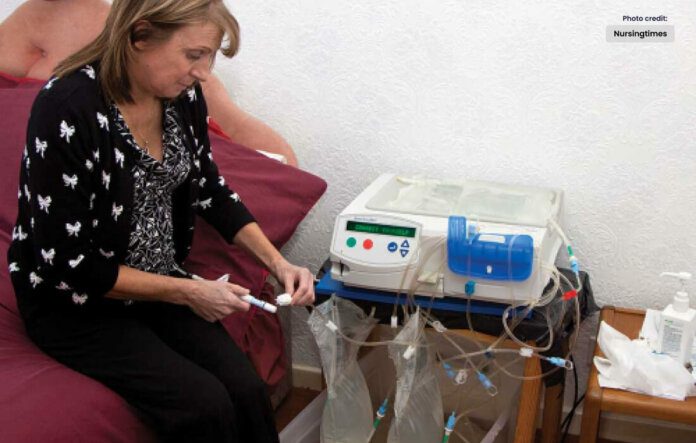Peritoneal dialysis empowers kidney patients to manage their health.
Introduction:
Kidney disease is a prevalent health concern that affects millions of people worldwide. Among the available treatment options for kidney failure, (PD) stands out as an effective and patient-friendly alternative to traditional hemodialysis. Further this blog will delve into the world of this, exploring its benefits, procedure, and the freedom it offers to patients to manage their condition in the comfort of their own homes.
Understanding Peritoneal Dialysis:
This is a life-saving medical procedure use to treat end-stage kidney disease (ESKD) by removing waste products and excess fluids from the body. Unlike hemodialysis, which requires patients to visit specialized centers, it can be perform at home, providing individuals with a more flexible and independent treatment option.
The Peritoneal Membrane: A Vital Ally:
At the heart of peritoneal dialysis lies the peritoneal membrane, a thin, semi-permeable lining that surrounds the abdominal organs. Basically during the procedure, a sterile dialysis solution is introduced into the peritoneal cavity through a catheter, and waste products from the blood pass through the membrane and into the solution. After a period of dwell time, the fluid, now containing toxins and excess fluids, is drained out, completing one cycle of this.
Types of Peritoneal Dialysis:
There are two main types of peritoneal dialysis:
-
Continuous Ambulatory Peritoneal Dialysis (CAPD):
In CAPD, the patient performs manual exchanges of dialysis fluid multiple times a day. There is no need for a machine, and patients can carry out their daily activities while on treatment.
-
Automated Peritoneal Dialysis (APD):
APD employs a cycler machine to perform exchanges automatically while the patient sleeps. This option offers more freedom during the day as it requires fewer manual exchanges.
Benefits of Peritoneal Dialysis:
-
Enhanced Quality of Life:
By allowing patients to undergo dialysis at home, peritoneal dialysis provides a sense of normalcy and independence, fostering an improved quality of life.
-
Flexible Treatment Schedule:
With CAPD and APD, patients have more control over their treatment schedules, also allowing them to manage their condition without compromising daily activities or work commitments.
-
Gentle on the Body:
It is generally considered gentler on the body compared to hemodialysis, as it maintains a more stable blood pressure and avoids drastic fluid shifts.
-
Reduced Dietary Restrictions:
Patients on it may have fewer dietary restrictions compared to hemodialysis, granting them greater dietary flexibility.
-
Lower Healthcare Costs:
Home-based peritoneal dialysis can lead to reduced healthcare costs as it eliminates the need for frequent visits to dialysis centers and associated expenses.
Challenges and Considerations:
While peritoneal dialysis offers many advantages, it may not be suitable for everyone. Patients with significant abdominal surgeries or infections may not be eligible for this procedure. Additionally, It requires a level of discipline, as it involves adhering to a strict regimen to prevent infection and ensure optimal outcomes.
Conclusion:
It stands as a viable and empowering option for patients with end-stage kidney disease. Its ability to be conducted at home, coupled with the freedom it grants to individuals to manage their treatment, makes it a game-changer in the field of kidney health. However, like any medical procedure, it is essential to consult with healthcare professionals to determine the most appropriate treatment plan for each patient’s unique circumstances.
As medical technology continues to advance, it remains an invaluable tool in the fight against kidney disease, enriching the lives of countless individuals and underscoring the significance of patient-centric care in the modern healthcare landscape.




